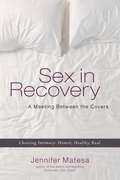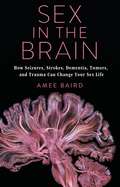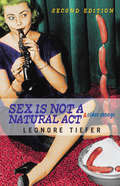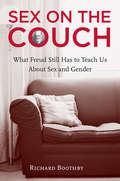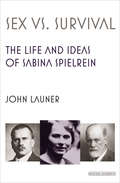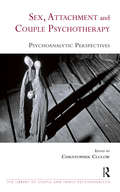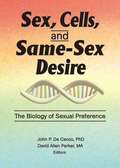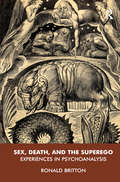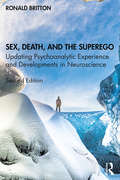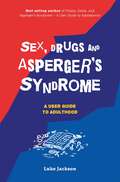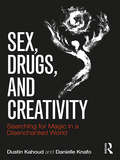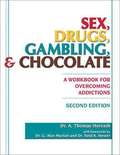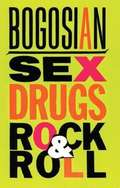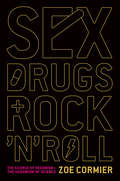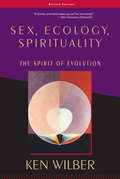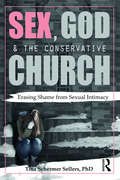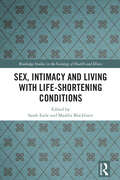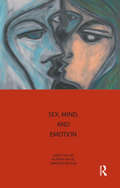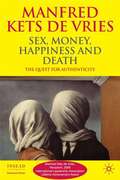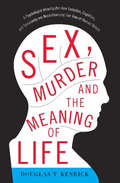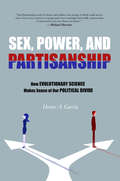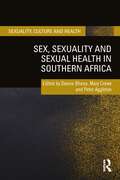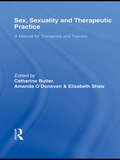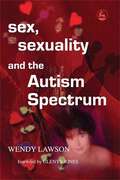- Table View
- List View
Sex in Recovery: A Meeting Between the Covers
by Jennifer MatesaHealthy sexuality within the context of recovery is rarely talked about openly, in part because the larger culture restricts the space required to name our experiences in open, honest ways. Matesa gives us that space by bringing the language of recovery to this more hidden part of our healing, allowing us to truly “practice these principles in all our affairs."Sexuality in the context of recovery is rarely talked about openly, in part because our broader culture may inhibit us from sharing our true experiences. For some, the prospect of sober sex feels like uncharted waters—in the past, we’ve rarely had sex without first numbing ourselves with drugs and alcohol. What does it mean to have an intimate relationship in sobriety? Exploring that question deepens our recovery journey.With this groundbreaking work, Jennifer Matesa uncovers the challenges real people encounter when they start taking their clothes off—without drinking or using in order to do so. Providing readers “a meeting between the covers,” Matesa blends first-person accounts bravely shared by diverse members of the recovery community, insights from experts, and her own perspectives. The result is a book that creates a space for a vital, new dialogue about sexuality and intimacy. As we find a common language for this more hidden aspect of our healing, we can truly “practice these principles in all our affairs.”
Sex in the Brain: How Seizures, Strokes, Dementia, Tumors, and Trauma Can Change Your Sex Life
by Amee BairdWhat controls our sex lives? Our brains. Yet there is surprisingly little research into how our brains influence one of the most fundamental of all human behaviors. And there is even less understanding of what can happen to the sexuality of a person who suffers a brain injury or illness such as a stroke, Parkinson’s disease, or dementia.In Sex in the Brain, clinical neuropsychologist Amee Baird explores fascinating case studies of dramatic changes in sexual behavior and explains what these exceptional stories have to say about human sexuality. She illuminates the extraordinary insights into how the brain works that injury or disease can divulge. Each chapter includes striking personal accounts, many from individuals Baird has met in her clinical practice, of unexpected shifts in sexuality. Until now these fascinating, frightening, and funny stories have been hidden in medical journals or untold outside of the clinical setting. This revealing and sometimes heartbreaking book unfolds a better understanding of the links between brain function and our sexual selves.
Sex is not a Natural Act and Other Essays
by Leonore TieferRevisits and updates the centrality of the social construction of sexuality, especially in the age of Viagra, FSD (female sexual dysfunction) and the media saturation of sex. Leonore Tiefer is one of the foremost sexologists working in the United States today; she is a well-known and respected scholar who writes engagingly and humorously about a wide array of topics in sexuality to appeal to both students and general readers. Revised and updated with new pieces on the medicalization of sex, FSD (female sexual dysfunction) and the politics of sex, as well as classic pieces found in the original edition, such as Am I Normal?: The Question of Sex.
Sex on the Couch: What Freud Still Has To Teach Us About Sex and Gender
by Richard BoothbyFirst published in 2006. Routledge is an imprint of Taylor & Francis, an informa company.
Sex vs. Survival: The Life and Ideas of Sabina Spielrein
by John Launer&“An impressively researched, documented, and readable biography&” of a woman who played a key role in the history of psychology (Library Journal, starred review). Who was Sabina Spielrein? She is probably best known for her notorious affair with Carl Jung, which was dramatized in the film A Dangerous Method, starring Keira Knightley. Yet her life story is much more compelling than just one famous relationship. Spielrein overcame family and psychological abuse to become a profoundly original thinker in her own right. Sex vs. Survival is the first biography to put her life and ideas at the center of the story and examine Spielrein&’s key role in the development of psychoanalysis. Drawing on fresh research into Spielrein&’s diaries, papers, and correspondence, John Launer shows how Spielrein&’s overlooked ideas―rejected by Freud and Jung but substantially vindicated by later developments in psychology and evolutionary biology—may represent the last and most important stage in the rediscovery of an extraordinary life. &“An invaluable resource for understanding Spielrein&’s significance, her progressive thinking, and her groundbreaking contributions to the history of psychoanalysis.&” —Publishers Weekly &“By the end of Launer&’s account, there&’s no mistaking what the founding fathers of analysis did to this particular founding mother—and probably to many other women. At least this biography offers Spielrein some retrospective justice.&” —Jewish Book World
Sex, Attachment and Couple Psychotherapy: Psychoanalytic Perspectives (The Library of Couple and Family Psychoanalysis)
by Christopher ClulowThe contributors to this book have drawn on different mentors to provide a framework for understanding the sexual problems of the couples they see, and to inform the work they do. But whether Freud, Jung, Klein or Bowlby has been the progenitor of their own particular therapeutic narrative, the spirit of enquiry and curiosity is evident in their approach. This has created space to explore the dimensions of sex, love, hate and power in ways that allow the facts of life to emerge and be discovered as something unique and authentic to each couple. It has also created a platform from which new understandings may emerge to inform practice in the future.
Sex, Cells, and Same-Sex Desire: The Biology of Sexual Preference
by David A ParkerThis fascinating new book explores the myriad aspects of biological theories of sexual preference. Sex, Cells, and Same-Sex Desire describes, reviews, and questions recent biological research on sexual preference from the point of view of knowledgeable scientists and of scholars in the social sciences and humanities representing the emerging field of gay studies. The issues involved have a vibrant history, are wide-ranging, and remain the objects of much controversy. This book demystifies biological research on sexual preference and makes it accessible to readers unfamiliar with biological and medical research.Sex, Cells, and Same-Sex Desire is divided into several sections, each of which is introduced by an explanation of key concepts and terms found in that section. The book begins with a discussion of the history of biological theories and sociocultural concepts of gender and sexuality. The next 3 sections explore specialized areas of biological science and related issues: genetics and evaluation, hormones and the endocrine system, and brain physiology and structure. A final section discusses social stigma, science, and medicine. A glossary of terms used by the authors is included, so readers may look up those that may be unfamiliar.
Sex, Death, and the Superego: Experiences in Psychoanalysis
by Ronald BrittonThis book is a personal reappraisal of psychoanalytic theories in the light of clinical experience. The first part is about sexuality and begins where psychoanalysis began, with hysteria. The second part is about the ego and the super-ego, the relationship of which dominated Freud's writing from his middle period onwards. The last part is on narcissism and the narcissistic disorders, a major preoccupation of psychoanalysis in the second half of the twentieth century.
Sex, Death, and the Superego: Updating Psychoanalytic Experience and Developments in Neuroscience
by Ronald BrittonThis second edition of Ronald Britton’s personal reappraisal of psychoanalytic theories is based on further clinical experience, further study of current neuroscience and continued reflection on the relationship of brain and mind, selfhood and self-awareness, belief and knowledge, and certainty and uncertainty. Divided into three parts – "Hysteria," "The ego and superego," and "Narcissism" – this new edition adds content on brain, mind and self, the death instinct and a discussion on the biological, psychological and sociological basis of gender. It suggests that our increasing knowledge necessarily produces a dissolution of our coherent concepts of mind and brain, and that during this phase of creative dissolution we need to reassess what we know and what we don’t know. Fundamental to the book is the notion that human beings have to live with probability but that we long for certainty, and create it for ourselves. This book will be of great interest to psychoanalysts in clinical practice and academia, as well as other mental health professionals and those with an interest in psychoanalytic theory.
Sex, Drugs and Asperger's Syndrome (ASD): A User Guide to Adulthood
by Tony Attwood Luke JacksonLuke Jackson's unabridged and sparkling sequel to his best-selling user guide to adolescence Freaks, Geeks and Asperger Syndrome is the must-read handbook for teenagers and young adults on the autism spectrum. With devastating clarity, Luke focuses on the pitfalls involved in navigating the transition to adulthood, and the challenges of adult life. He covers everything from bullying and drugs to socialising, sex, negotiating relationships, and finding and keeping your first job.
Sex, Drugs and Creativity: Searching for Magic in a Disenchanted World (Psychological Issues)
by Dustin Kahoud Danielle KnafoIn Sex, Drugs, and Creativity: The Search for Magic in a Disenchanted World, Kahoud and Knafo take a close look at omnipotent fantasies in three domains: sex, drugs, and creativity. They demonstrate how these fantasies emerge and how artists draw on them both to create and destroy—sometimes simultaneously – and how understanding this can help psychoanalysts work more effectively with these individuals. Using the personal statements of influential artists and entertainers, in addition to clinical material, the authors examine the omnipotence of self-destruction as it contends with that of creative artists. The authors argue that creative artists use omnipotent fantasies to imagine the world differently - this enables them to produce their art, but also leaves these artists vulnerable to addiction. Chapters devoted to Stephen King and Anne Sexton demonstrate the ways these authors used drugs and alcohol to fuel imagination and inspire creative output while simultaneously doing harm to themselves. A detailed case study also demonstrates successful clinical work with a creative substance user. Sex, Drugs, and Creativity will appeal to anyone interested in the links between creativity and substance use, and will be of great use to psychoanalysts and mental health practitioners working with these challenging clients.
Sex, Drugs, Gambling, and Chocolate: A Workbook for Overcoming Addictions
by A. Thomas HorvathThere is an alternative to 12-step! Eliminate or reduce any type of addictive behavior with the new second edition of this practical and effective workbook. Treats addictions "as a whole," rather than dealing separately with each issue (e. g. , drinking, smoking, overeating, gambling. . . ). Dr. Horvath's rational approach is based on scientifically validated methods and emphasizes taking responsibility for your actions, without requiring an allegiance to a "higher power. " Teaches readers about consequences (and even possible benefits) of addictive behavior, alternative coping methods, choice, understanding and coping with urges, building a new lifestyle, preventing relapse. Includes dozens of exercises, self-study questions, guidelines for individual change plans.
Sex, Drugs, Rock & Roll
by Eric BogosianBogosian explores the dark underbelly of the American dream with blistering prose, trenchant social criticism and breathtakingly accurate characterizations of an astonishing range of his fellow citizens.
Sex, Drugs, and Rock 'n' Roll: The Science of Hedonism and the Hedonism of Science
by Zoe CormierFull of noise and color, Sex, Drugs, and Rock ’n’ Roll looks at scientists and their craft, how hedonistic impulses inform our highest pursuits, and how the renegades of science have illuminated the secrets of our deepest impulses. It is a fascinating tale of scientists on the edge, experimenting on themselves and others, that asks the big (and strange) questions about what it means to be human, about consciousness and happiness, the future and past of our species, our scientific knowledge, and our culture. Not to mention our parties. It will pull you in and gross you out, but it never loses sight of the stories, ideas, and scientific discoveries that make sex, drugs, and rock ’n’ roll so timeless.
Sex, Ecology, Spirituality: The Spirit of Evolution, Second Edition
by Ken WilberIn this tour de force of scholarship and vision, Ken Wilber traces the course of evolution from matter to life to mind and describes the common patterns that evolution takes in all three of these domains. From the emergence of mind, he traces the evolution of human consciousness through its major stages of growth and development. He particularly focuses on modernity and postmodernity: what they mean; how they impact gender issues, psychotherapy, ecological concerns, and various liberation movements; and how the modern and postmodern world conceive of Spirit. This second edition features forty pages of new material, new diagrams, and extensively revised notes.
Sex, Freedom, and Power in Imperial Germany, 1880-1914
by Edward Ross DickinsonThis is a study of the intense, complex, and escalating debate over sexuality and sexual morality that roiled politics in Germany between 1880 and 1914. That debate was grounded in the rapid evolution and growing complexity of German society - the multiplication of cultural groupings, professional associations, and social movements; the emergence of new social groups, social milieus, and professions; the rapid development of the media and commercial entertainments; and so on. All parties involved understood it to be a debate over the most fundamental question of modern political life: how to secure both national power and individual freedom in the context of rapid social and cultural change.
Sex, God, and the Conservative Church: Erasing Shame from Sexual Intimacy
by Tina Schermer SellersSex, God, and the Conservative Church guides psychotherapy and sexology clinicians on how to treat clients who grew up in a conservative faith—mired in sexual shame and dysfunction—and who desire to both heal and hold on to their faith orientation. The author first walks clinicians and readers through a critique of Western culture and the conservative Christian Church, and their effects on intimate partnerships and sexual lives. The book provides clinicians a way to understand the faulty sexual ethic of the early church, while revealing the hidden mystical sex and body positive understanding of sexuality of the Hebrew people. The book also includes chapters on strategies for a new sexual ethic, on clinical steps to heal religious sexual shame, and on specific sex therapy interventions clinicians can use directly in their practice. Finally, it offers a four step model for healing religious sexual shame and actual touch and non-touch exercises to bring healing and intimacy into a person's life.
Sex, Intimacy and Living with Life-Shortening Conditions
by Sarah Earle Maddie BlackburnThis multi-disciplinary and inclusive collection brings together theoretically informed and empirically focused research on sex, intimacy and reproduction in relation to young people and adults with life-shortening conditions. Advances in healthcare mean that increasing numbers of young people with life-shortening conditions are transitioning into adulthood. Issues such as sex and intimacy, dating and relationships, fertility and having children are increasingly relevant to them and to the people that support them, including families, carers, practitioners and professional education, health and social care agencies. This three-part book explores the relevance and significance of this field, examines everyday experiences, and highlights the challenges faced by individuals and organisations in addressing the needs of such people in daily life and in the context of practice. Drawing on perspectives from sociology, disability studies, epidemiology, health policy, psychotherapy, legal studies, queer studies and nursing, this ground-breaking volume is written by academics, policy makers, practitioners and experts by experience. It is an essential read for all those practising and researching in the fields of sexuality, chronic illness and disability and transition.
Sex, Mind, and Emotion: Innovation in Psychological Theory and Practice
by Heather Wood Janice Hiller Winifred BoltonSex, Mind, and Emotion is a collection of predominantly clinical papers, exploring innovative work in the field. The central tenet of the book is that sexual behaviour cannot be divorced from the emotional context in which it occurs or the meaning of that behaviour to the individual and therefore no chapter is about sex without also addressing mind and emotion. The book uses a fusion of psychoanalytic, systemic and cognitive theories in conjunction with public service practice. It deals with important and relevant topics such as the treatment of sex offenders; the compulsive use of internet pornography; the psychosexual development of adolescents growing up with HIV; the psychodynamics of unsafe sex; refugees and sexuality; services for people with gender dysphoria; psychological treatment for survivors of rape and sexual assault; and loss of sexual interest.
Sex, Money, Happiness, And Death
by Manfred Kets De VriesThe four main tenets of life are explored in this unique new book that examines the interface between psychology and management. Based on his own experiences as a clinician and psychoanalyst, the author provides insights into the issue of the life/work balance.
Sex, Murder, and the Meaning of Life: A Psychologist Investigates How Evolution, Cognition, and Complexity are Revolutionizing our View of Human Nature
by Douglas T. Kenrick"Kenrick writes like a dream. "--Robert Sapolsky, Professor of Biology and Neurology, Stanford University; author of A Primate's Memoir and Why Zebras Don't Get Ulcers What do sex and murder have to do with the meaning of life? Everything. In Sex, Murder, and the Meaning of Life, social psychologist Douglas Kenrick exposes the selfish animalistic underside of human nature, and shows how it is intimately connected to our greatest and most selfless achievements. Masterfully integrating cognitive science, evolutionary psychology, and complexity theory, this intriguing book paints a comprehensive picture of the principles that govern our lives. As Kenrick divulges, beneath our civilized veneer, human beings are a lot like howling hyenas and barking baboons, with heads full of homicidal tendencies and sexual fantasies. But, in his view, many ingrained, apparently irrational behaviors--such as inclinations to one-night stands, racial prejudices, and conspicuous consumption--ultimately manifest what he calls "Deep Rationality. " Although our heads are full of simple selfish biases that evolved to help our ancestors survive, modern human beings are anything but simple and selfish cavemen. Kenrick argues that simple and selfish mental mechanisms we inherited from our ancestors ultimately give rise to the multifaceted social lives that we humans lead today, and to the most positive features of humanity, including generosity, artistic creativity, love, and familial bonds. And out of those simple mechanisms emerge all the complexities of society, including international conflicts and global economic markets. By exploring the nuance of social psychology and the surprising results of his own research, Kenrick offers a detailed picture of what makes us caring, creative, and complex--that is, fully human. Illuminated with stories from Kenrick's own colorful experiences -- from his criminally inclined shantytown Irish relatives, his own multiple high school expulsions, broken marriages, and homicidal fantasies, to his eventual success as an evolutionary psychologist and loving father of two boys separated by 26 years -- this book is an exploration of our mental biases and failures, and our mind's great successes. Idiosyncratic, controversial, and fascinating, Sex, Murder, and the Meaning of Life uncovers the pitfalls and promise of our biological inheritance.
Sex, Power, and Partisanship: How Evolutionary Science Makes Sense of Our Political Divide
by Hector A. GarciaAn evolutionary psychologist traces the roots of political divisions back to our primate ancestors and male-dominated social hierarchies.Through the lens of evolutionary science, this book offers a novel perspective on why we hold our political ideas, and why they are so often in conflict. Drawing on examples from across the animal kingdom, clinical psychologist Hector A. Garcia reveals how even the most complex political processes can be influenced by our basic drives to survive and reproduce--including the policies we back, whether we are liberal or conservative, and whether we are inspired or repelled by the words of a president. The author demonstrates how our political orientations derive from an ancestral history of violent male competition, surprisingly influencing how we respond to issues as wide-ranging as affirmative action, women's rights, social welfare, abortion, foreign policy, and even global warming. Critically, the author shows us how our instinctive political tribalism can keep us from achieving stable, functioning societies, and offers solutions for rising above our ancestral past.
Sex, Sexuality and Sexual Health in Southern Africa (Sexuality, Culture and Health)
by Deevia BhanaThis book—Sex, Sexuality and Sexual Health in Southern Africa—is structured around four major themes: gender and sexuality diversity; love, pleasure and respect; gender, sexual violence and health; and sexuality, gender and sexual justice. Chapters in this book analyse sexuality in relation to recent developments in the Southern African region and what this might mean for contemporary theory, policy and practice. Sex, sexuality and sexual health are often viewed through a narrow biomedical lens, ignoring the fact that they are profoundly social and historical in character. The contributors in this book bring to light the entanglements of sexuality with respect, recognition, rights and mutual respectful pleasure. Authors draw attention to partnerships, allyships and feminist, queer and trans coalitions in the pursuit of sexual health and justice in the region. The book will be of interest to final-year undergraduate and postgraduate students, researchers and activists as well as those working in Women and Gender Studies, Critical Sexuality Studies, Sexual and Reproductive Health, Development Studies, Public Health, Psychology, Education, Sociology and Anthropology.
Sex, Sexuality and Therapeutic Practice: A Manual for Therapists and Trainers
by Catherine ButlerSexuality is an important area of clients’ lives yet it is often neglected, both in the consulting room and in training. This book examines issues of sexuality in a positive and affirming light and considers how sexuality-related issues can be introduced into therapy and training. Sex and sexuality are important to consider in psychotherapy, psychology, counselling and health provision across a variety of contexts and are relevant to clinicians and therapists working in health and mental health settings as well as in specialist services such as sexual and reproductive health and HIV. Sex, Sexuality and Therapeutic Practice opens with a general discussion of sex and sexuality before considering how the therapists can think and talk about sexuality in practical and self-reflective ways in different circumstances. Each chapter in the book focuses on a specific topic with areas covered including: sexual diversity across the lifespan health and disability sexual and gender minority issues how culture and sexuality interact. The manual provides up-to-date information, further reading, handouts for clients, self-reflective exercises and examples of training exercises for workshops and teaching. It is an essential resource for health professionals, therapists, clinicians, academics and trainers, and will support the practicing therapist as well as those in training.
Sex, Sexuality and the Autism Spectrum
by Wendy LawsonWritten by an 'insider', an openly gay autistic adult, Wendy Lawson writes frankly and honestly about autism, sex and sexuality. In her new book, she draws upon her own experience to examine the implications of being autistic on relationships, sex and sexuality. Having discussed subjects such as basic sex education and autism, the author goes further to explore the wider issues of interpersonal relationships, same sex attraction, bisexuality and transgender issues. She also examines the unspoken rules that exist between people in relationships and explains why these rules can be difficult and confusing for people with autism. This book will give courage and information to adults with autism or Asperger Syndrome and provide essential insights to those living and working with them.
